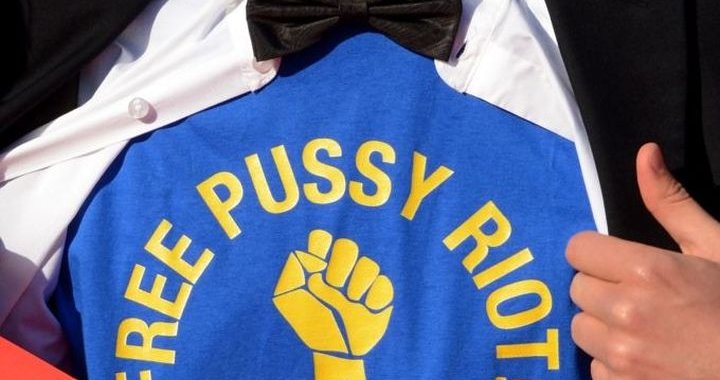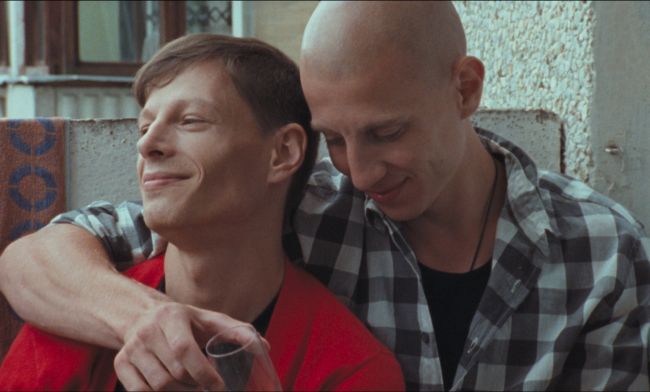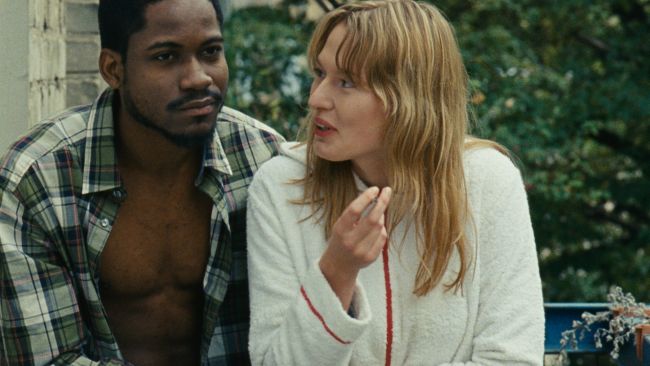
Pussy Riot T-shirt and the Leftist Discourse. Interview with filmmaker Romas Zabaraukas
Etsuj
13/08/2013
I am pleased to introduce you to Romas Zabarauskas, a young filmmaker and LGBT-rights leader in Lithuania who has just premiered the first-ever map of LGBT-friendly establishments in the Baltics. From being a student at the Sorbonne, to directing the first Lithuanian short film on a gay theme, “Porno Melodrama”, Romas has already had his big festival début at the Berlinale and is now finishing his first feature film – “We Will Riot”. He belongs to various different worlds simultaneously: film-making, the media, the LGTB community, activism, and recently - celebrity circles.

Director Romas Zabarauskas. Photo: Reda Mickeviciute
Hi, Romas. I remember you as a very young man – more a boy, really – who came to Berlin to pitch his first film at the Berlin International Film Festival of 2010. You were a bit lost, but I had a feeling that you knew what you wanted and what your goals were. The following summer, you convinced me to help you and we fund-raised for your film at the “Schwuz” club. What's been going on with you over these last four years?
First of all, I have produced and released a short film – “Porno Melodrama”. After a successful pitch at the 2010 Berlinale, it was you who helped me contact the Berlin gay club “Schwuz”. They allowed us to fund-raise during their Eurovision party in June. I was there at the entrance, explaining to all of the visitors how my film, “Porno Melodrama”, challenged the “Protection of Minors” law that considers information “which expresses contempt for family values, encourages the concept of entry into a marriage and creation of a family other than stipulated in the Constitution of the Republic of Lithuania and the Civil Code of the Republic of Lithuania” as having “a Detrimental Effect on the Development of Minors”. Representatives from Amnesty International were also on-site, talking about the situation of gay rights in Lithuania. “Schwuz” promised us 1 euro from each visitor, which resulted in a donation of 800 euros – which was very important to my film back then.
Since then, I've finished “Porno Melodrama” and screened it at the Berlinale Panorama 2011. It is still traveling the world. In Lithuania, our premiere caused quite a big media frenzy, which was also due to the fact that during the premiere I told the audience that I am gay. Overnight, I became a media personality who speaks out for LGBT-rights.
“Porno Melodrama” Trailer
At the moment, I have just finished my debut feature, “We Will Riot”, which premiered at the Moscow International Film Festival. I'm now preparing for its Lithuanian theatrical release in September, which will be my first serious step towards a commercial career.
As for the homophobic “Protection of Minors” law, it passed, but in a lighter version, which didn't seem to have any effect. Amnesty International kept criticizing it, as did I, but I'm rather more focused on other things, like the gay and lesbian partnership law. Just recently though, our national television, LRT, had agreed to broadcast ads for Baltic Pride, but then they changed their mind, and moved all of them to air only after 11:00 PM, using the “Protection of Minors” law as an excuse. So, sadly enough, this goes to show that the law is still relevant and needs to be changed. That said, my own films are not affected by it – both of them got an official 16+ rating.

Still of “Porno Melodrama”. Matas and Jonas (actors Kurtis and Marius Repsys)
Recently the Vilnius Contemporary Art Centre hosted the exhibition “From Dusk till Dawn”. 20 Years of LGBT Freedom in Lithuania, curated by Laima Kreivyte. After the opening, I saw on Facebook that you were dissatisfied about not being included in the time-line of Lithuania's queer history.
Yes, it was a queer art exhibition that had a special time-line portraying all major events in Lithuania – not just related to art, but also to activism. My film Porno Melodrama was included in the catalogue, but not in the main time-line published on the wall. I was really upset; also, I knew that the curator of the exhibition, Laima Kreivyte, hates my film. She has publicly written that this film is worthless “backwards propaganda”. Critics like her hate my attempts to change the Lithuanian public sphere with the help of international support and the mainstream press. They believe that I'm only fueling outdated identity politics – and I believe that there is nothing worse than their post-soviet traumas mixed with postmodern obscurantism. The label queer has no direct translation in Lithuanian, and it is often used as a vague excuse for not being involved in direct activism based on representation – as it is precisely in Kreivytė's case, who goes as far as avoiding questions about her sexuality.
Later I emailed Kreivytė herself, and she assured me that it was only a technical problem, and that in fact, three different films were not included in that time-line, just by coincidence. Yet if this is true, then they should release an official statement saying so.
Please understand me correctly – if the exhibition would have been radically queer, I would have no objections about not being included. I don't position myself as a radical, but I know of what it should have consisted. As one friend told me after the exhibition – Miley Cyrus' “We Can't Stop” was more queer than this showcase. There was almost no sex, no dirty provocations, no drag, camp or radical politics – things that are usually associated with the queer notion. Why then even call it queer? Just because it's more vague?...
Laima Kreivytė, however, did include my other event in her time-line – the LGBT Friendly stickers cause. It was an initiative that I started last summer. We asked cafes and restaurants to visibly put out our stickers in support of the LGBT community. Just last week, we prolonged this cause with a map that was funded by 17 cafes/restaurants/clubs marked on the map. That’s what I like about this project – it is based on mutual benefits, and no government/EU funding is needed.

Still of “We Will Riot”. Luke (actor Ebeneezer Nii Sowah) and his grandma (actress Olita Dautartaitė)
As you can suspect, the LGBT community in Lithuania is experiencing various tensions. However, these tensions happen in every small community. And maybe they are not that bad. It is actually the basis – the start of – a democratic mode. In addition, these conflicts allow for new content to appear, which is what the public craves. The audience observes as different groups fight each other – and they happily clap their hands! Of course, a certain solidarity should be encouraged within the community . Yet I'm used to expressing my emotions on Facebook, so that's what I did in this situation as well.
Let’s continue a bit about Facebook. Not only do you express your emotions, you also give out a lot of information about your projects. You use it in a very active way. How much do you think social media has contributed to the media frenzy around you? I remember when you even deleted your Facebook account, and made a sort of “Facebook suicide”…
Yes, I had a proper drama with Facebook. At first, I used it strictly for friends, but then I deleted it; then I resurrected it again and opened it to the public. I now have 1650 friends and 350 followers, and a couple of pages that I administrate. As for the media frenzy, I'm not sure whether it should be taken at face value. It's very difficult to say what fame means and how it operates.
At the moment in Lithuania, it has almost become a rule for journalists to quote the Facebook posts of famous people. Some of my posts have been quoted and written about as well. For example, the most popular news website, DELFI, reposted my announcement about submitting a complaint to the theater awards “Auksinis Kryžius”; namely, about the commission's decision to not nominate any women in the Best Actor categories. My comments on Baltic Pride and other similar issues have also been quoted.
In general, I use Facebook because I find it interesting. And certainly, even I am addicted to it. I feel a psychological pleasure from sharing my ideas, and it's no secret that I also promote my projects and films, as well as LGBT equality. I suppose that the new generation, including me, understands promotion as a part of everyday life, and we do not stigmatize this activity. To promote oneself is a completely normal, even necessary, activity, and it's without any bad connotations. It doesn't have any moral or political implications anymore.
“We Will Riot” Teaser
Could you tell me a bit more about your film's Moscow premiere, and the “Free Pussy Riot” T-shirt incident?
It all started when I pitched my film,“We Will Riot”, at the Meeting Point Vilnius film industry conference in Vilnius last spring. There were program organizers from different film festivals there, and I gave them all our screening DVDs. A few weeks later, I got an invitation to participate in the Moscow International Film Festival. I was really surprised – I didn't think the subjects of corruption, racism and homophobia could fit the context of Russia that deals with the very same problems. On second thought, I realized it's politically good for Russia to show a film on these subjects, one that is based in Lithuania, not Russia... On the other hand, during similar events, Russia portrays itself as a country that is open, democratic and able to accept critique. They even had three gay films in their Main Competition Program, but it was only a masquerade – a one-time cultural event that is far from the true reality in Russia.
After having these thoughts, I came up with the idea to go one step further. During the opening, I joined Canadian producer Becca Blackwood, who was walking the red carpet. As we reached the photographers, I unbuttoned my white shirt and showed a hidden “Free Pussy Riot” T-shirt. The next morning, the photos were all over the internet - it went viral on Russia's biggest social network, vkontakte.ru, and Facebook. It was also covered by The Hollywood Reporter and mentioned in The Moscow News and in the Russian edition of Variety. The official Russian media ignored it, but the fact that it went viral so quickly indicates that even small steps can reach a huge audience and break through the censorship of the mainstream media.
If we were to interpret the T-shirt incident as an art performance, we would quickly notice its symbolism. Do we all have political T-shirts under our black-tie appearances?.. Does it make any sense to show a T-shirt only for the press, then button it up and go on with the official party?.. In other words, can we fight the system with its own tools?
Following this thought, I can say that I am thinking more and more about celebrity culture and human-interest journalism. Humanity today is obsessed with celebrities, and the current decade is particularly interesting in that even the most radical activism is represented by celebrities. WikiLeaks founder Julian Assange, the Pussy Riot women, now Edward Snowden – all of them are not only activists, but also celebrities – and they all are, let’s face it, sexually attractive! The question is, should we embrace it? And should artists contribute to the visual communication that is so central in today's celebrity-driven world, or is it actually an issue of total cynicism that we should reject? These are the questions that I am trying to pose to myself in my film We Will Riot, and in everyday life, because I am also participating in similar games going on in Lithuania.

Still of “We Will Riot”. Luke (actor Ebeneezer Nii Sowah) and Marta (actress Beata Tiškevič)
You mentioned several days ago this duality that you experience because of your political views and then going on to do projects that necessitate another attitude…
Yes – sometimes I joke with my liberal friends that we are doing the same things, the only difference is that I consider my actions immoral. But I also think that the left-wing discourse is sort of stuck in its own self-reflection, by trying to define what is “more left” than “left”, and which “politics” are not really political...
I also hate the left's elitism. Academics and artists should think more about their audiences. It's OK to have a technical language for professionals which they use to talk with other professionals. It's the same as plumbers or IT specialists who have their own jargons that I wouldn't get. But their results are very simple and useful for society, and it should be the same with the outcomes of activism, politics and art.
I was discussing this issue with an art curator in Moscow recently. He told me that art and academia are stealing money from the right (redistributed money from the capitalist system, donations from rich collectors and other sources) and creating a leftist discourse with it. I think that this point of view is false – not only is nothing being stolen, but the obscure arts and theories become a fetish that, in itself, confirms the prestige of the upper class. If it doesn't reach a wide audience and if it doesn't have any real political effect, then it's not really leftist for me. Therefore, I often choose to conform with the capitalist logic of celebrity culture and I reach for a bigger impact – rather then retreat to the obscurantism and vague shadows of post-soviet post-modernism.